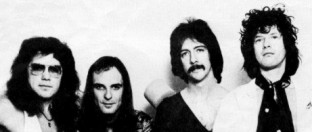Max Webster
By MAD STONE
('#' - indicates a link to webmaster's comment)
Success has given KIM MITCHELL a headache. And it's not the kind that will go away with two aspirins and plenty of rest.
You would think he'd be on top of the world now. After seven years of struggling through the mire of the Canadian music scene, Max Webster, the band Mitchell co-founded, now has a platinum album with A MILLION VACATIONS. Three previous albums have gone gold and a live album is in the works. The band's future appears rosy, to say the least. Most musicians would sell their own mothers to be in the same position. So why the long face from MITCHELL?
It seems he has discovered, as most recording artists eventually do, that the music industry is a heartless taskmaster. Mitchell is now aware that in the eyes of a record company executive, he is just a music machine which will be kept in use for only as long as it continues to produce. An unproductive musician is an unprofitable one.
The whole idea of writing for dollars, although it makes perfect sense from the business point of view, is distasteful to MITCHELL: hence the headache.
Until now, he has been labouring under the delusion that a record company is like a concerned parent - there to praise you when you're doing well and comfort you when you're not. While the band continued its seven-year ascent to the top of the charts, nothing appeared to contradict this rather naive theory, although MITCHELL admits now that he and lyricist PYE DUBOIS had to compromise their writing at times.
But the full force of the industry's heartlessness did not really hit home until MAX returned earlier this year from what is referred to in the business as a "triumphant" European tour. The band was hot, the crowds were enthusiastic and the reviews, for the most part, were favourable. On that tour, MAX had been fronting for Canadian heavy rock masters RUSH (both groups are managed by Ray Daniels and SRO), but before the 19 English dates were over, MAX had been asked back to headline their own tour this October.
And that's when the problem really started.
It seems that when a Canadian band tours Europe, or England, they lose money as a matter of course. The costs of transporting the group, its entourage and equipment across the sea and back again is prohibitive, so unless the group was huge before it left, the tour loses money.
There's usually a shortfall (the difference between what they make and what they spend) of anywhere from $10,000 and up, depending on how extravagant their stage show is.
The record company usually picks up the shortfall in the belief that a successful tour will lead to greater album sales (which is where the company makes all its money anyway). But in this case, for some reason that Capitol refuses to discuss, the tour was turned down.
"This just doesn't make sense," said MITCHELL in a recent interview at his Toronto home. "I think there is more to this than what the band was told as an excuse.
"We went over to Europe and did great. We did phenomenal. So good that we got asked back. They flipped out over there. The whole thing when we arrived felt great... The interviews were together, everything flowed really nice...
"By the end of the English tour, when we were ready to go to the Continent, they had penciled in our own tour to come back in October. Right? We had it all figured out, all the advertisements were ready to go up and everything and then Capitol U.S. said: 'NO. We are not going to give them the money.'
"Now if we bombed, I could understand. If we just went over there and blew it, they'd say forget it. But we were going over there with our first headline tour and we've sold three times the albums RUSH had sold when they did it. And the odds are so good for us to break out of Canada and not be so regional. And they just say no.
"So that puts a big question mark over my head. Why were we even signed to them?"
RAY DANIELS, the man behind SRO Canada and the managerial mind behind RUSH's and MAX's success, says despite evidence to the contrary, Capitol U.S. is very interested in MAX WEBSTER. "They've just picked up the option for two more albums," he said in a recent interview. "MAX has a very lucrative deal with them."
DANIELS says that Capitol probably feels they have already made their commitment to the band by financing the first European tour with Rush. He said that the next tour is cancelled because EMI, the British arm of Capitol, doesn't want to put up the money it would take to keep the band in Europe for a tour. He estimates about $75,000 is involved, and that doesn't include money for promotion, which would add another $30,000 to that figure. DANIELS says there is no point in paying for the group's tour unless money is spent on promotion. DANIELS says that everywhere SRO has control of tour and promotion budgets, the group has done well, and both MITCHELL and DUBOIS do not hesitate to agree. "With record sales like we have had in Canada and the success we have had here, we can go to the States and to Europe if we want," says DUBOIS, also a MAX co-founder and MITCHELL's cohort and confidant. "We can make enough money to do that.
"But the contradiction is so apparent - if we are so successful here, why can't the record company back us in another area?"
SCOOT ERWIN, a spokesman for Capitol in Toronto, refused to comment on why the tour was stalled. LINDA EMERSON, a spokesman for ANTHEM, MAX's Canadian label which is distributed by Capitol, says the U.S. record company is waiting for the band to put out a new album before they agree to finance another tour. But why the company would want to wait for a new album, the quality of which will be anyone's guess, when it now has a potential million-seller with MILLION VACATIONS, is hard to understand.
And if things keep going the way they are for MITCHELL, who says he has a writer's block brought on by his problems with the industry, there may not be another album to support.
"As a write, I've always just written," says MITCHELL. "That's the way DUBOIS and I write. We've actually said:'I don't care what we write, we're just going to do this.'
As it is now, with the band getting bigger and all these record company people and pressure coming down on you...they start demanding what kind of tunes they want to hear written...and that's shutting me down. That's shutting down my creativity for some reason. That's a problem that's come up.
I'll get through it. It's just that they are all around me and they are so close, saying: 'We want this kind of tune and you've got to write that kind of tune or else you're never going to be able to record ever again, or we'll take your firstborn, or whatever.' It's like that. And I'm really bitter at the whole industry right now."
MITCHELL says the radio arm of the industry is every bit as bad as the record companies. He says program directors have virtually wiped out a whole middle segment of bands, the bands who were not huge but who had frequent airplay and a sizeable following.
"Who's really big is really big. And then there are all these other bands that used to get airplay but the music industry has totally wiped them out.
"The radio people - they've just taken it and scooped it away. I think we are in that segment at least on a Canadian level and now on a European level. And they are really kicking us in the ass. They're telling us either write what's on the radio, or get out, we don't want to spend money on you. And that's a drag, because those bands are probably the hardest working.
FM stations are playing stuff that you can hear once and whistle to. They forget the rest. You turn it on during the day now and all you hear is acoustic guitars and pretty harmonies.
"There's only one station in Toronto for punters, meaning rock fans who are kind of interested in hearing some new stuff and hearing the odd of-the-wall thing; that's CFNY, and it's doing poorly."
MITCHELL says the major advertisers don't like CFNY because its "too noisy or too weird" so the station attracts only smaller advertisers, and although their dollars are appreciated, it's not enough to keep the station going.
"So I have a bad picture of all these program directors. They are just sitting back controlling this. They come from Tide soap and Ravioli and Kelloggs and stuff. That's where they come from and they dictate to these record jocks what songs to play and how to run their shows and what to say, when.
"I find it really funny when I hear stuff like 'Toronto's best rock' - that's such a stupid slogan. FM radio is very big now and it's making money because all these assholes are coming in. But before there was a nice contrast. FM used to be nice to listen to. You could rock out once in a while. Sometimes they would just drop on cut from an album, as opposed to what they do now which is just playing special cuts and all the rest of them have a piece of tape over them. They actually have pieces of tape on albums. The program directors say: 'You can't play that song and make sure to say "Best Rock" four times an hour.'
"I won't go into it any more, but I'm very bitter at the scene today."
"It's all so slick and polished," says PYE. "And that's exactly what it shouldn't be."
"You can take all the shots at FM radio you want," says DANIELS, "But it has helped some small bands become big. Groups like BOSTON and FLEETWOOD MAC. At the same time, FM has destroyed those middle bands but it's reversing its trend."
DANIELS says most of the pressure KIM is feeling to write more commercial songs is coming from Capitol, not SRO. He says Capitol is in search of the "almighty hit single". MAX's sales in the U.S. at the moment are disappointingly low, he admits.
In an effort to boost those sales, the record company is asking the groups for songs that will sell, songs that in MITCHELL's words "you hear once and whistle to." For MITCHELL, writing such tunes would mean losing the bands identity, something he is morbidly afraid of.
Ironically, material being written by the other members of the band - bassist DAVE MYLES, drummer GARY McCRACKEN and keyboard player TERRY WATKINSON - seems to better meet the record companies demands for commercial songs.
Let Go the Line, written and sung by Watkinson, received extensive airplay immeadiately following the release of MILLION VACATIONS. And the title track on the album was written by MYLES and sung by McCRACKEN.#
With so many writers in the band, selecting material for albums is a convoluted process, says PYE. And although he says the choice is ultimately a democratic one, the feeling is left that his and MITCHELL's opinions carry a bit more weight than the others.
The connections between the five members go back to their high school days in Sarnia, Ont., but because DUBOIS writes with MITCHELL, he is closest to him. And although DUBOIS obviously sympathizes with MITCHELL's concerns about the music industry and the band's identity, he is not as worried about the group's future.
"MAX is going to be very, very big in the next two or three years, or it's not going to exist. It depends on KIM and I. I don't care what anybody says. You can really get screwed up in the head about all these people out there who seem to be against you and do not seem committed toward a goal. But in the end I think it's the creative people who win out. You just have to stick with it.
"It was pretty well raw energy and raw innocence and just a healthy attitude toward writing that brought MAX to this point. Now, as adult writers, more or less, we've got a different role to play, only because there are different people involved.
"There's more at stake, there's more risks that weren't there before. We have a responsibility to ourselves, the record company, the manager, and they are appropriate and realistic responsibilities.
"I don't want to put my foot in my mouth, but to me they don't hold a lot of water. I would never feel guilty about bumping out there with another really weird tune. Some people might. Some people might come to grips with those responsibilities and hold to them. Whereas I wouldn't.
"If the public can't accept what I'm writing now, fine. They'll probably come back to me later when I come up with a tune that fulfills their expectations more or less. And I think that's what you have to do - you have to keep writing."
PYE says he also doesn't feel the pressures as strongly as KIM because he deals infrequently with the record company. "They probably don't deal with me more because I may be a little more up front. I may say yes or no very quickly and I don't think they would understand that. It intimidates them. But I think you have to go by your guts.
I think that if you don't go by your instincts in the arts, you have no business being in the arts."
PYE says KIM's slump is not affecting his writing. He keeps "Puttering away" just as he has always done. But without the music, his words cannot become songs. Both he and KIM seem to feel it's something that KIM will get over, but how and when remains to be seen.
At the moment MAX is mixing a live album that was recorded this fall at several one-nighters in Ontario. And there are plans for a fifth studio album.
But unless Kim gets over his problems before then, there may be a scarcity of MITCHELL-DUBOIS originals on the album, which again, would change the bands identity.
"We're in a tough position," says PYE. "MAX is in a tough position. KIM is bummed out and it's appropriate. Again, I'm putting my foot in my mouth, but it's a pretty good band and we've put out four pretty astounding albums for a Canadian band.
"And to not be more successful is a kick in the nuts." Thanks to the following:
Barn Painter Near Me in Waterloo
Super Steam London
Relationship Counseling
Dezansocialmedia.ca


